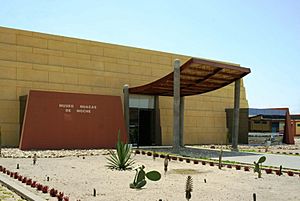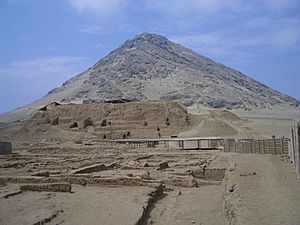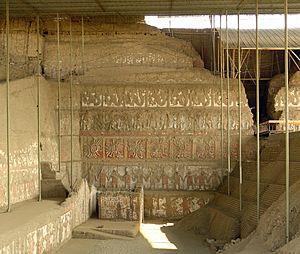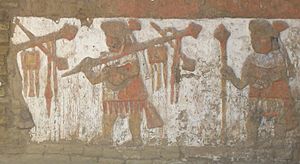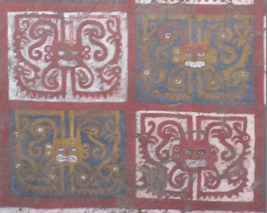Huaca de la Luna facts for kids
Quick facts for kids Huaca de la Luna |
|
|---|---|
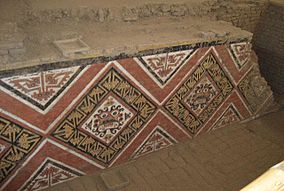
|
|
| Location | |
| Nearest city | |
| Established | Mochica era |
The Huaca de la Luna (which means "Temple of the Moon") is a very old and large building. It was built mostly from adobe bricks by the Moche people. They lived in northern Peru a long time ago.
The Huaca de la Luna is part of a bigger ancient city called Huacas de Moche. This city was once the capital of the Moche people. It is located near a volcanic peak named Cerro Blanco.
Contents
Exploring the Huaca de la Luna
The Huacas de Moche site is about 4 kilometers (2.5 miles) outside the modern city of Trujillo. It's close to the Moche River valley. There are two main temples, or huacas, at the site: the Huaca de la Luna and the Huaca del Sol.
Why Huaca de la Luna is Special
Even though the Huaca de la Luna is smaller, it has given archaeologists a lot of information. The Huaca del Sol was partly destroyed and robbed by Spanish explorers in the 1600s. But the Huaca de la Luna was mostly left alone.
Experts believe the Huaca del Sol was used for managing the city, military activities, and homes. It might have also been a burial place for important Moche leaders. The Huaca de la Luna was mainly used for religious ceremonies and special events. It also contains some burials.
Colors and Murals of the Past
Today, the Huaca de la Luna looks like soft brown adobe bricks. But when it was first built, it was very colorful! It had murals painted in black, bright red, sky blue, white, and yellow. Over time, the sun and weather have made these beautiful paintings fade away.
Inside the Huaca, there are other murals from earlier building stages. Many of these paintings show a god known as Ayapec. This name means "all knowing" in the Muchik language. Another name for a Moche god is "Wrinkle-Face," given by the later Inca people because of how the god looked.
Building with Bricks and Teams
Many of the bricks used to build the Huaca de la Luna have special marks. There are over 100 different marks! These marks might have shown which group of workers made the bricks. Perhaps each team had a mark to put on their bricks. This could have helped count how many bricks each team laid. It might have been used for payment or even for friendly competition!
Parts of the Huaca de la Luna
The Huaca de la Luna is a large complex with three main platforms. Each platform had a different purpose.
The northern platform was once decorated with many colorful murals and carvings. Sadly, it was destroyed by people looking for treasures. The central and southern platforms are still standing and have been studied a lot by archaeologists.
The central platform has revealed several important burials. These burials included many beautiful ceramic pots and other valuable items. This suggests it was a burial ground for important Moche religious leaders.
The eastern platform, along with a black rock and nearby open areas, was used for special rituals. These rituals are shown in many Moche artworks, especially on painted pottery. Archaeologists have found skeletons of adult males at the base of the rock. These skeletons show signs of injury, often a strong blow to the head.
Protecting the Ancient Site
The World Monuments Fund is working at Huaca de la Luna. They help protect this important historical site. Their work includes checking the site, recording discoveries, and making sure the excavated buildings and decorations stay strong.
See also
 In Spanish: Huaca de la Luna para niños
In Spanish: Huaca de la Luna para niños
 | John T. Biggers |
 | Thomas Blackshear |
 | Mark Bradford |
 | Beverly Buchanan |


